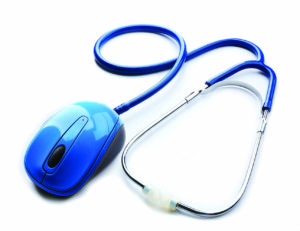Trending
Cy•ber•chon•dri•a (n.): A diagnosis from Dr. Google
January, 2017

We’ve all been there. Something seems a bit off, health-wise—like a mole you swear wasn’t there before or a cough that just won’t go away. And though you know it’s probably nothing, concern creeps in. Thanks to the Internet, the days of going directly to the doctor for a diagnosis are dwindling. For many, Google has become the first stop for symptom checking. This practice, though convenient, may be doing more harm than good. Here we explore cyberchondria.
What Is Cyberchondria?
Cyberchondria is the compulsion to search the web for health-related information and information about specific symptoms (real or imagined). People who have cyberchondria tend to use the Internet to self-diagnose, usually assuming the worst-case scenario.
Its Origins
The term “cyberchondria” began popping up in the early 2000s; it blends the words “cyber” and “hypochondria,” which is the tendency to fear that you have medical conditions you don’t actually have.
The Good & The Bad
Checking your symptoms online isn’t necessarily a bad thing. In fact, researching health-related topics can make you a more informed patient. Internet research can help you communicate more effectively with your doctor, ask smart questions and take an active role in your health.
Problems arise, however, when turning to the Internet for answers doesn’t help you feel more in control of your health, but instead makes you feel more anxious. Many common medical conditions share symptoms with more serious diseases. And an online search can easily link your symptom with something sinister. Pretty soon you’ve entered into an anxiety-inducing cycle of symptom checking—a few clicks of your mouse has turned your heartburn into a heart attack and your tension headache into a brain tumour.
A Growing Concern
Cyberchondria can cause people to have a distorted or incomplete understanding of their symptoms, which is a concern for many doctors. A doctor considers many factors when making a diagnosis—things like the patient’s age, overall health, medical history and family history. When patients self-diagnose on the Internet, they often aren’t looking at the full picture of their health, yet their health anxiety is causing them to believe the (not always reliable) information they found online over their doctor’s professional opinion.
When a patient has self-diagnosed and has spent hours researching a certain medical condition online before visiting their doctor, it can lead to an incorrect diagnosis from their doctor. Patients may unintentionally exaggerate certain symptoms, suppress certain symptoms or even imagine symptoms to support their Internet diagnosis, which means their doctor can’t diagnose them correctly.
Could You Be a Cyberchondriac?
The line between taking a healthy interest in your well-being and obsessively checking symptoms online is blurry at best, but there are specific signs that you are vulnerable to cyberchondria:
• When you experience any symptom, the first thing you do is Google it.
• You don’t stop at one website. You visit multiple sites for each symptom you experience.
• You spend a lot of time looking up health-related information online—sometimes hours a day. You may have even missed work, family time or social engagements.
• Your primary online activity is searching health information.
• You trust your online research over your doctor’s opinion—even though you’ve gotten the all clear from your doctor, you still aren’t convinced you’re fine.
How to Combat It
The next time you experience a symptom, resist the urge to Google, and make a doctor’s appointment instead. If you must go online, make sure you visit a reputable source for medical information. Ask your doctor to recommend a credible website.
If health anxiety and online symptom checking is affecting your daily life, it may be time to seek advice from a mental health professional. t8n
Fun Facts
A 2009 Statistics Canada survey found that 70% of Canadian Internet users search for health information online. The same study revealed that 74% of women and 66% of men used the Internet to search information about health or medical conditions.
Did You Know?
One of the most-at-risk groups for cyberchondria is new parents—or, more specifically, new moms—who search the Internet or visit online forums to check that their newborn’s symptoms or behaviours are normal.












